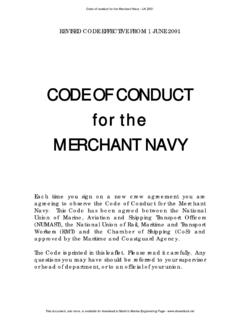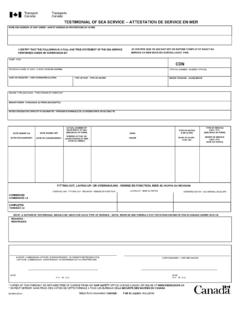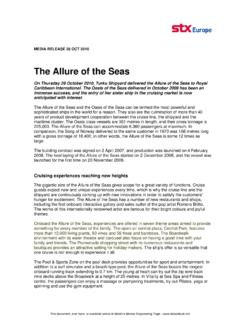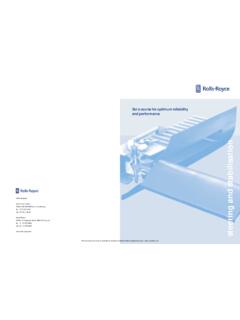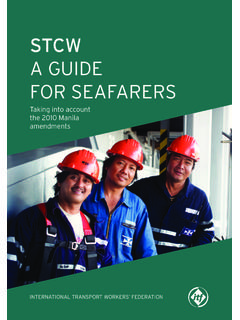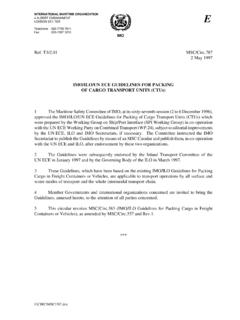Transcription of Maritime Salary Review - dieselduck
1 Maritime Salary ReviewJuly 2012It is an industry buffeted in most sectors by poor vessel earnings, rising costs and ever more stringent regulation. Profits are down, some high profile names are experiencing serious difficulties and the outlook at best is uncertain. Yet despite these factors, salaries were up in 2011, fundamentally driven by a skill shortage. This trend looks set to continue throughout 2012. Unlike the ships which it services, the workforce needed to manage the merchant fleet, whether technically, operationally or commercially is not oversupplied. The legacy of a lack of training in the 1980s during the previous recession and the often perceived low status of jobs in the shipping industry means that the pool of highly qualified candidates continues to shrink.
2 Companies recognise that good people are not necessarily readily available and need to be retained and properly incentivised. IntroductionHow professionals in the shipping industry, whether at sea or ashore, are remunerated can be a complicated and varied picture. Mark Charman - Group CEOWe would like to thank all those who participated in this survey and will be running this on an annual basis to help the industry build a better picture of the movement of remuneration and employment trends over the coming results of this survey are based on responses from shipping professionals working in every global shipping centre and from seafarers worldwide. It takes in all the world s major merchant trades, as well as offshore, cruise, superyachts, tugs and other niche sectors. The survey was sent out in April 2012 and received 4,000 responses from shipping industry workers data we present here shows some interesting insights into the transition from sea to shore, the variety of packages available to employees and the range of salaries across the industry.
3 The findings are designed to be useful to both employees and employers. We hope that employees, particularly seafarers, will be able to gain a clearer picture of the many career opportunities open to them once ashore and the salaries which they can expect to achieve. All too often transiting to the shore-side sector is seen as something which only the most senior officers can do, but people with five to ten years seafaring experience are most certainly in demand. At the same time, we hope that employers can use this data to help inform them about hiring decisions and internal pay reviews. WorkboatTankerPassengerOtherDry cargoCellularWorkboatTankerPassengerOthe rDry cargoCellularSeagoing (vessels worked on): Shorebased (market area):Response Breakdown:Survey SummaryNOTE: ALL SALARIES WITHIN THIS DOCUMENT ARE DISPLAYED IN USD$.
4 EXCHANGE RATES HAVE BEEN CALCULATED AS FOLLOWS:USD$1 = EUR / GBP / NOK / SGD / IDR / CHF Benefits Shorebased Seagoing1. Salaries at sea. 2011 vs 20122. Salaries at sea by vessel type3. Salaries at sea by seafarer origin4. Salary vs years experience5. Salaries ashore. 2011 vs 20126. Salaries by job title7. Salaries by working region8. Salary vs years experience9. Benefits ashore by company type10. Benefits at sea by company type11. Benefits (sea and ashore) by regionContents01020304050 Increase 5%+Increase up to 5%StaticDecrease 50% 30%12% 8%Seafarers are split in two camps those who have experienced a significant above inflation pay rise and those who have had to accept a pay cut. A closer look at the data reveals that it is those in the less senior positions who are bearing the brunt of the pay cuts.
5 Yet far fewer of their shore based counterparts have experienced these levels of Salary cuts - only 9% on shore reported seeing their pay packet drop last year. Is this a case of out of sight, out of mind? Salaries at vs 20122011 vs 2012 Salary changes:Job TitleSalary Last YearSalary This Year% ChangeMaster Mariner$112,738$115,613+ Engineer$102,391$112,208+ Officer$94,673$100,860+ Engineer$71,036$74,659+ TitleSalary Last YearSalary This Year% ChangeMaster Mariner$95,351$110,981+ Engineer$84,760$98,963+ Officer$64,910$82,737+ Engineer$65,123$75,019+ TitleSalary Last YearSalary This Year% ChangeMaster Mariner$119,823$128,247+7%Chief Engineer$109,557$114,874+ Officer$83,584$87,313+ Engineer$52,987$55,632+5%OFFSHOREJob TitleSalary Last YearSalary This Year% ChangeMaster Mariner$124,864$153,379+ Engineer$91,978$103,319+ Officer$65,883$67,908+3%Second Engineer$73,199$66, at typeThe figures below show that Eastern European seafarers cease to be an emerging market or a source of cheap labour.
6 From Croatia to Poland, there is an excellent network of training institutions which are producing some very able officers. East European engineers are in particular demand. However, when it comes to client facing roles, we can see that West Europeans are still perceived by employers to be the most desirable. British, Dutch, German and Scandinavian master mariners in particular are highly regarded and continue to command a significant Salary premium over their East European and Asian counterparts. National variations in officers salaries are becoming slowly less pronounced and we believe that this trend will continue as increasing numbers of officers enter the workforce from a wide range of for second and chief engineers has created the desire for employers to consider all nationalities in the engine room.
7 The current most skill-short area is second engineers with five years experience, and it is those candidates in particular who are receiving the top at originCANDIDATE ORIGINJob typeWestern Europe (Inc. Scandinavia)Eastern EuropeAsiaMaster Mariner$138,320$109,627$111,422 Chief Engineer$104,628$104,448$102,740 Chief Officer$90,273$74,653$74,319 Second Engineer$81,871$81,125$72,996 Salary (US$)Number of years at sea0200004000060000800001000001200001400 001 to 56 to 1011 to 15 16 - 20 20 +Over a 20 year working career at sea, an officer can expect to see his or her Salary double in real terms. The graph below clearly shows a steady growth in income as an officer rises through the ranks. However, the diagram on the right demonstrates that those who move ashore after between 6 and 10 years at sea can see a significant rise in their income compared to what they might have expected had they stayed at sea.
8 This is not to say that all those that come ashore can expect to see an immediate pay rise, but perhaps that many of those who do leave within 10 years are high fliers who have made a rapid progression through the ranks and are also very successful when working ashore. Salaries at vs experienceAverage Salary by years at sea:Average shorebased Salary for ex-seafarers based on years at sea:020000400006000080000100000120000140 000 Salary (US$)Number of years at sea1 to 5 6 - 10 11 - 15 16+0102030405056%10%17%17%Despite the tough market conditions and a very turbulent year, the fact that over half of the respondents have seen their Salary rise by over 5% in the past 12 months, is indicative of the tightness of the employment market and the fact that companies will pay more to retain their skilled staff.
9 Whilst some will have achieved these rises by changing jobs, many of these rises are due to internal promotion. However, companies can still afford to make incremental Salary increases to help retain staff and we have seen less Salary freezes across the board compared with previous 5%+Increase up to 5%StaticDecreaseSalaries vs 20122011 vs 2012 Salary changes:Job typeAnnual basic salaryAverage bonusCharterer$100,49313%Chartering Director$227,14020%Chartering Manager$110,51018%Fleet/Technical Manager$123,51816%Fleet Personnel Manager$59,3218%Marine Consultant$100,7437%Marine Surveyor$89,7057%Shipbroker (Chartering)$81,66626%Ship Operator$82,07411%Superintendent (Marine)$88,66310%Superintendent (Technical)$96,45612%The table above reveals the range of salaries in the Maritime market. An interesting statistic is the closeness in Salary between the ship operator and shipbroker.
10 Whilst gauging the average shipbroker s Salary is of course very difficult as it takes in such a wide range of earnings and markets, the fact is that the role of the ship operator has become increasingly highly regarded. A good ship operator can make the difference between commercial success and failure and are in demand not only within shipping companies, but also commodity houses and can also see the high levels of Salary achieved by marine consultants working for consultancies. Often a big cog in a small wheel when compared to their class and flag counterparts, marine consultancy employees need to be equally comfortable in a boiler suit as they are in a suit presenting their findings to their clients. Not every technical expert has the ability to interpret complex engineering issues to a non-technical audience.


